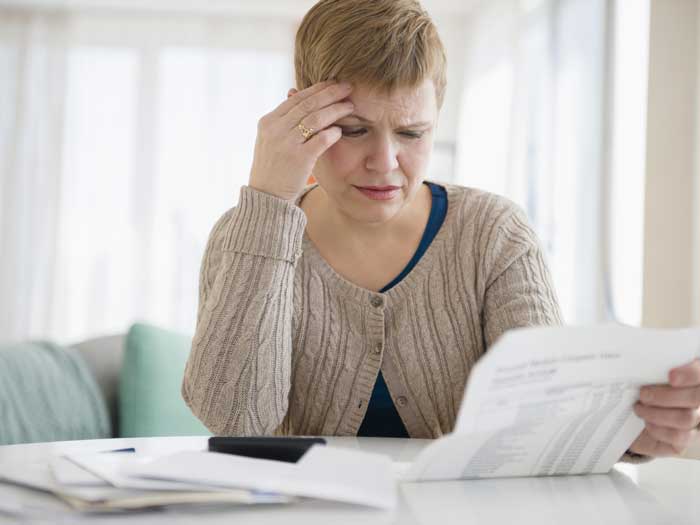
Are you aware of these 5 common debt myths?
 There are alternatives to bankruptcy for those experiencing debt, and a professional can help you explore those options (Getty Images/JGI/Jamie Grill)
There are alternatives to bankruptcy for those experiencing debt, and a professional can help you explore those options (Getty Images/JGI/Jamie Grill)
Talking about debt can be emotional, bringing up a range of feelings from guilt to fear that stem as far back as childhood, when our relationship with money begins to form.
Understanding debt and its vicious cycle is also full of misconceptions about how we got there and how we can find a way out.
Here is a breakdown of five common debt myths and how to avoid falling for them.
MYTH 1: IF I HAVE DEBT, I’M A BAD PERSON
Associating net worth with self-worth is commonplace and misguided, notes Stacy Yanchuk Oleksy, CEO, Credit Counselling Canada.
This attachment, she adds, fuels feelings of shame and embarrassment in those with debt, and can lead to feelings of worthlessness, hopelessness and avoidance. Subsequently, they may accumulate more debt, or seek quick fixes instead of longer-term interventions, she explains.
• Feature: 5 financial mistakes to avoid when you’re young
• Resource: Owning your financial identity webinar series
“When people are in debt, the first thing they do is feel dumb. They start to turtle a bit and search for solutions that are not necessarily good for them,” she says.
To avoid this trap, work with a professional to assess your financial situation and find a curated solution that tackles issues one step at a time, recommends CPA Michael Massoud, director, finance and controller for CPA Canada and a volunteer for the organization’s financial literacy program. “Seeking tailored advice on debt management can potentially provide solutions you may not have thought of,” he says.
MYTH 2: IF I CAN MAKE THE MINIMUM PAYMENT, I CAN AFFORD TO KEEP SPENDING
Minimum payments go mainly towards the interest (dependent upon its rate), with little affecting the principal balance, warns Yanchuk Oleksy.
“That’s where you get into the never-never plan where you can never pay the balance off,” she says.
If you’re unable to pay a balance in full, Yanchuk Oleksy recommends paying even $5 more than the minimum payment to halt the debt cycle.
• Feature: Be cautious when using Buy-Now-Pay-Later for online purchases
• Feature: How to avoid emotional spending
To curb spending on non-essential items, consumers should identify triggers or bad habits. For example, if shopping online while watching TV leads to unnecessary purchases, avoid storing credit card numbers on devices and set a weekly allowance for .yourself.
“Knowing your financial temptations and weaknesses will help you avoid them,” says Massoud.
MYTH 3: BANKRUPTCY IS MY ONLY OPTION
Yanchuk Oleksy concedes that those who have already refinanced, consolidated debt or been turn downed for a loan may assume the worst.
She advises those in this situation to take a step back (and a deep breath) and explore all possible and perhaps unknown routes before committing to that direction.
• Feature: 4 things to know before declaring personal bankruptcy
• Feature: Give your personal finances a reset with these simple tips
Other options include tackling debt independently with a financial planning revamp. This involves strict budgeting, selling off assets, increasing income and/or decreasing expenses. “That’s clawing your way out,” she explains.
The second option is seeking assistance through services, including non-profit credit counsellors, to come up with a strategic, long-term plan to pay down debt.
“As people get a grasp on information, they often come to the conclusion that the situation is not as bad as they thought it was,” says Massoud. The third route is legal, in the form of bankruptcy or a consumer proposal, which should be a last resort, he adds.
MYTH 4: I’M NOT ON THE HOOK FOR JOINT DEBT
Those who partake in joint or co-signed loans—whether it’s to purchase a house, car or assist a family member or friend—must remember that, if one one party fails to honour their side of the financial agreement, the other party is responsible for it.
“Let’s say my brother and I have a joint loan. If he doesn’t make the payments, then I must make the payments,” Yanchuk Oleksy explains. “Similarly, if I become a co-signer on a loan because my brother doesn’t have good credit, but I do, if he goes bankrupt on that debt, I am still on the hook for that debt in its whole amount.”
• Feature: Turn those tough financial talks into united lifelong goals
• Resource: Love and money: How to discuss money with your partner
Massoud recommends entering financial relationships cautiously, ensuring there is trust between parties and a preparedness to accept the consequences if something goes awry. If a relationship ends, he adds, make sure the names of those no longer responsible for the debt are removed from agreements.
“We encourage consumers to be very careful about being joined with debt,” he adds. “You have to plan for life taking you or another person out by the knees.”
MYTH 5: IF MY SPOUSE OR FAMILY MEMBER DIES, THEIR DEBT COMES TO ME
There are scenarios where people assume they’re responsible for another’s debt, when they are not.
For example, if a loved one, such as a parent, passes away, next of kin, be they a spouse or child, is not responsible for any debt held by that individual if it’s not joint or co-signed.
• Resource: Financial literacy podcast: Mastering Money
• Resource: Financial wellness guide
Instead, explains Yanchuk Oleksy, that debt is paid out through the deceased’s estate. Any debt that cannot be paid via the estate is dismissed.
“Debts die with the person unless they are joined or cosigned,” she says. “If the estate cannot afford it, then the creditors just lose. They can’t come after the kids or anybody else.”
Similarly, she notes, life insurance policies held by the deceased that identify a direct beneficiary are not assumed by the estate but are rather paid out directly to that named individual. “That supersedes the creditors as well,” she says.
GET ON THE RIGHT SIDE OF DEBT
Listen to the latest season of the Mastering Money podcast, which touches on debt-related topics, including the state of debt in Canada and debt traps to avoid. And find out how to get on the right side of debt before it gets ahead of you.